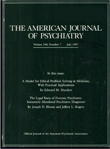Sleep deprivation combined with consecutive sleep phase advance as a fast-acting therapy in depression: an open pilot trial in medicated and unmedicated patients
Abstract
OBJECTIVE: The authors' goal was to test the hypothesis that the antidepressant effect of total sleep deprivation can be maintained by initially avoiding sleep during a supposedly "critical" time period in the early morning. METHOD: They studied 33 inpatients with major depression, melancholic type, all of whom responded positively to total sleep deprivation. Twelve of the patients were men and 21 were women; their mean age was 46.7 years (SD = 13.7). After total sleep deprivation, the patients started a sleep schedule from 5:00 p.m. to 12:00 midnight, which then was shifted back by 1 hour each day until a sleep time of 11:00 p.m. to 6:00 a.m. was reached. RESULTS: Twenty (61%) of the 33 patients who responded to total sleep deprivation with an improved state of mood maintained this improvement during sleep phase advance therapy. Drug-free and medicated patients did not differ from each other. CONCLUSIONS: The rapid amelioration of mood observed with total sleep deprivation can be preserved with a succeeding phase shift of the sleep period.



